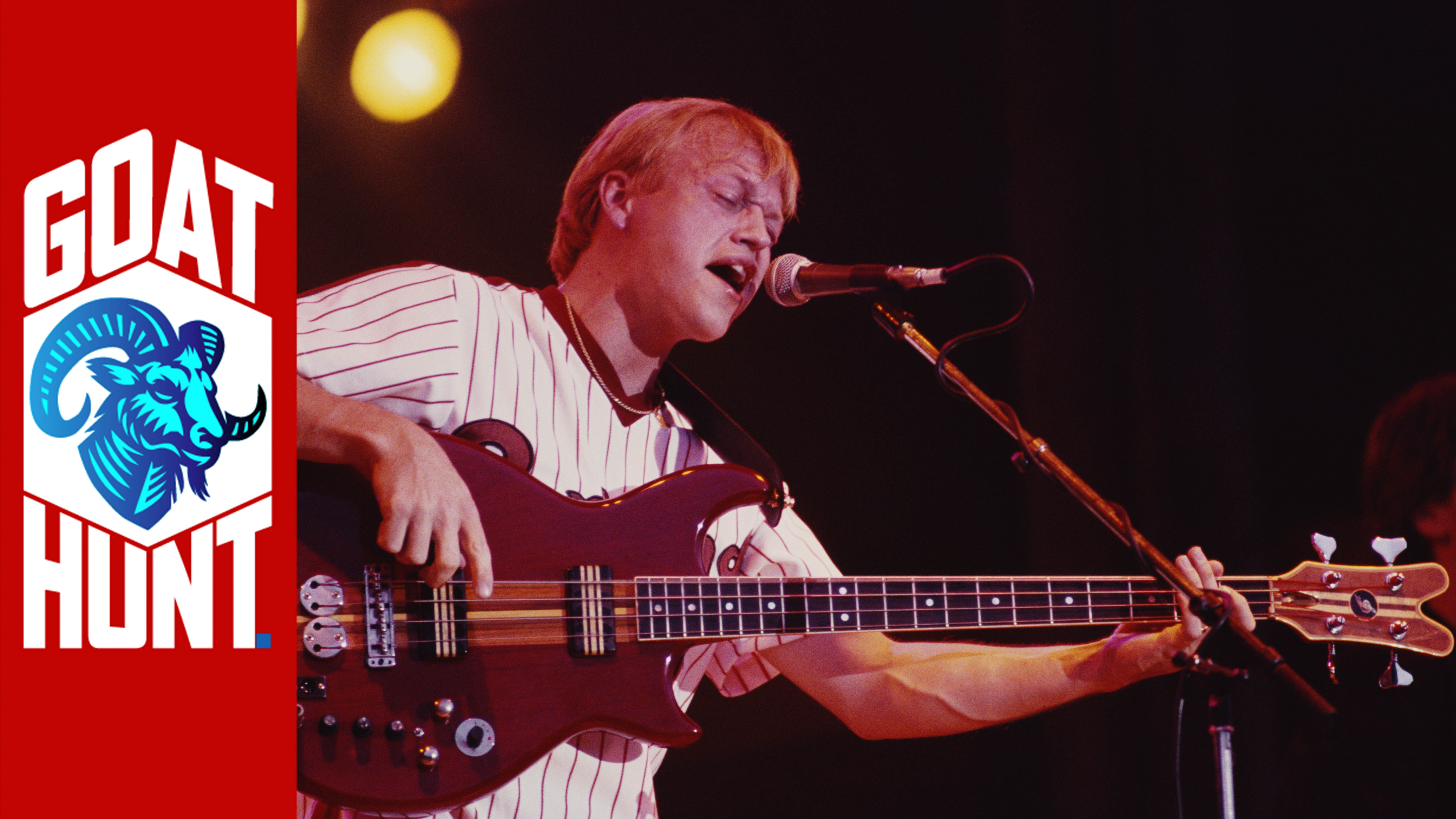The greatest bassists 1980-'99, ranked by you
GOAT Hunt: Your end of the century lords of the lowend revealed

We recently began our epic GOAT Hunt: the search to put together a fantasy band line-up made up entirely of the players who are considered the Greatest of All Time.

Neil Peart beat out Bonham to perch on the drum GOAT throne and, ominously, his Rush bandmate Geddy Lee was crowned greatest pre-1980 bassist...
Now we're continuing our hunt for the other 50% of your fantasy rhythm section by naming your top 10 bassists between 1980 and 1999.
They'll join the winners of our pre-80 and 2000+ votes in an epic run-off to determine the ultimate bass GOAT.
Stay tuned!
1. Mark King (Level 42)
The slap bass technique, or ‘thumping and plucking’ as it was originally called by its inventor Larry Graham, is a thoroughly American innovation – which makes it all the more remarkable that a Brit, Mark King of Level 42, took the style to a higher commercial level than any other bass player in the Eighties.
In that decade, Level 42’s jazz-funk hits were hugely popular, driven by King’s heavily-insured thumb, and the public’s ongoing affection for them means that the band continues to tour today. King is no one-trick pony, by the way: check out his solo and collaborative work for many deft, Jaco-inspired fingerstyle lines. Congrats from all of us to The King!
Want all the hottest music and gear news, reviews, deals, features and more, direct to your inbox? Sign up here.
2. Flea (Red Hot Chili Peppers)
Although the Australia-born Michael Balzary enjoyed a prolific career with the Red Hot Chili Peppers in the Eighties, delivering ferocious slap lines and leaping around the stage like a man possessed, it was in the following decade that his profile really took off.
Thanks to the Chilis’ fifth album, 1991’s Blood Sugar Sex Magik, he became known worldwide for his expert feel and clean, bell-like tone. It’s ironic that, on that album, he actually toned down his former bass pyrotechnics to give the songs room to breathe.
3. Les Claypool (Primus)
Primus should never have made it big, and yet they somehow did. Although they were routinely lumped in with the alternative metal sound, the guitars were relatively low in the mix and the drums were funky rather than heavy.
Les Claypool didn’t exactly sing, either: instead, he barked sarcastic, often spoken-word lines of surreal poetry that made only the most twisted kind of sense. What he did do, though, was play a unique form of bass.
Thumping and plucking was the basic template, but chords, slides, bends and chicken-scratch picking made it a style of Claypool’s own.
4. Guy Pratt (Madonna, David Gilmour)
Bassist, standup comedian, author and podcaster Guy Pratt – one of the true intellects of bass – earned his stripes with the indie band Icehouse before stepping up into the big league and taking Roger Waters’ place in Pink Floyd.
He later became Dave Gilmour’s touring bass player, and he recorded massively popular sessions with Madonna, Michael Jackson and dozens more along the way. His autobiography, My Bass & Other Animals (2007) is one of the must-read texts for anyone interested in this era.
5. Victor Wooten (Bela Fleck, solo)
If any bassist can truly come close to being ‘today’s Jaco Pastorius’, it has to be Victor Wooten, who shares that late pioneer’s on-stage energy, inner fire and insanely evolved chops.
The fact that the Woot is so high on this list, even though his career didn’t really get rolling until the Nineties, speaks volumes. His thinking goes way beyond bass, too: his regular camps teach attendees about the importance of communication with nature and each other, and about our spiritual value as people, just as much as powering our way across the fretboard at 250bpm.
6. Tony Levin (Peter Gabriel)
What all the bassists on this list have in common is that they step outside the bass box, and few musicians do this as radically as the great Tony Levin, who regularly straps drumsticks (the “Funk Fingers”) to his hands for a percussive approach to the strings.
A master of the terrifying Chapman Stick as well as the upright and electric bass, Levin is best known for his work with Peter Gabriel and King Crimson – but there is no area of music in which he does not excel. Check out his Stick Men jazz project and the prog outfit Liquid Tension Experiment for evidence.
7. Pino Palladino (sessions)
The Welsh bassist Pino Palladino has earned his place in this Top 10 several times over. His first step into the limelight came in 1983 with the unforgettable fretless line that he applied to Paul Young’s cover of Marvin Gaye’s ‘Wherever I Lay My Hat (That’s My Home)’. We’ve tried and failed to play that line ourselves many times – but let us know if you pull it off.
Pino went on to huge success with Jeff Beck, Gary Numan and The Who – can you imagine what it would be like to take the place of John Entwistle? – and his list of album credits is breathtaking.
8. Doug Wimbish (Living Colour)
A stalwart of the Sugar Hill label house band in the late Seventies and a fixture of our world throughout the Eighties, Nineties and beyond, the great Doug Wimbish is one of the most accomplished bass players on the planet.
He has been a member of Living Colour since 1992, where he delivers bass parts of enormous solidity and strength, but he’s equally known for his expert session playing with Annie Lennox, Mick Jagger and many more. He came very close to securing the spot in the Rolling Stones that ultimately went to Darryl Jones, as he revealed to Bass Player in 2020.
9. Marcus Miller (Miles Davis, solo)
What hasn’t the Man In The Pork Pie Hat, Marcus Miller, done when it comes to bass? He put in years as a session guy in his youth, he was a member of the Saturday Night Live band, he played with Miles Davis, he scooped every award in existence... the man is unstoppable.
Jazz is his home, but there’s nothing he can’t do. Witness his soundtrack compositions, his songwriting, his membership of SMV alongside Stanley Clarke and Victor Wooten, and the fact that he busts out a clarinet as well as playing bass. It’s Miller time, all right.
10. Cliff Burton (Metallica)
We never had the chance to see what Cliff Burton would have done with his phenomenal talent as a bass player and composer, because the poor guy was killed in a coach crash in September 1986 at the age of just 24.
Luckily for us, he did get the chance to record three pulverising but majestic albums with Metallica, shining particularly brightly with iconic bass parts on ‘(Anesthesia) Pulling Teeth’, ‘For Whom The Bell Tolls’ and his masterpiece, ‘Orion’. Cliff’s death is one of the cruellest in the entire rock and roll pantheon: we remember him by listening to his music and appreciating his craft.